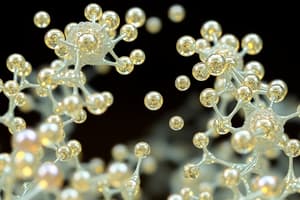Podcast
Questions and Answers
What effect do snake venom toxins have on red blood cells when injected into the bloodstream?
What effect do snake venom toxins have on red blood cells when injected into the bloodstream?
- They increase the oxygen-carrying capacity of RBCs.
- They convert phospholipids into lysophospholipids, leading to hemolysis. (correct)
- They stimulate RBC production in the bone marrow.
- They enhance the function of RBCs.
Which phospholipid is primarily responsible for forming the myelin sheath in the nervous system?
Which phospholipid is primarily responsible for forming the myelin sheath in the nervous system?
- Phosphatidylinositol
- Sphingomyelin (correct)
- Phosphatidylserine
- Phosphatidylcholine
What is one of the key roles of phospholipids in the human body?
What is one of the key roles of phospholipids in the human body?
- They assist in the digestion and absorption of fats. (correct)
- They serve solely as energy storage molecules.
- They exclusively form structural components of cell walls.
- They enhance bone mineral density.
Lung surfactant is essential for preventing respiratory distress syndrome in premature infants. What is the major component of this surfactant?
Lung surfactant is essential for preventing respiratory distress syndrome in premature infants. What is the major component of this surfactant?
What structure do phospholipids form when dispersed in water due to their amphipathic nature?
What structure do phospholipids form when dispersed in water due to their amphipathic nature?
What characterizes lipids as organic compounds?
What characterizes lipids as organic compounds?
Which of the following is NOT a type of glycerophospholipid?
Which of the following is NOT a type of glycerophospholipid?
Which of the following statements about phospholipids is correct?
Which of the following statements about phospholipids is correct?
What are the hydrolytic products of Phosphatidyl-Serine?
What are the hydrolytic products of Phosphatidyl-Serine?
What distinguishes derived lipids from simple and compound lipids?
What distinguishes derived lipids from simple and compound lipids?
Flashcards
Glycerophospholipids
Glycerophospholipids
A type of lipid composed of a glycerol backbone, two fatty acids, and a phosphate group, where the phosphate group is linked to another polar head group.
Phosphatidic acid
Phosphatidic acid
"Phosphatidic acid" is the simplest glycerophospholipid, formed by glycerol, two fatty acids, and a phosphate group. It's the precursor for other glycerophospholipids.
Phosphatidylcholine (Lecithin)
Phosphatidylcholine (Lecithin)
A type of glycerophospholipid containing choline as its head group. It's a major component of cell membranes and a source of choline.
Phospholipases (PLA1, PLA2, PLC, PLD)
Phospholipases (PLA1, PLA2, PLC, PLD)
Signup and view all the flashcards
Sphingophospholipids
Sphingophospholipids
Signup and view all the flashcards
What is Sphingomyelin?
What is Sphingomyelin?
Signup and view all the flashcards
What are Phospholipids?
What are Phospholipids?
Signup and view all the flashcards
What is the effect of snake venom toxins on cell membranes?
What is the effect of snake venom toxins on cell membranes?
Signup and view all the flashcards
What are Glycerophospholipids?
What are Glycerophospholipids?
Signup and view all the flashcards
What is Phosphatidic acid?
What is Phosphatidic acid?
Signup and view all the flashcards
Study Notes
Chemistry of Compound Lipids
- Compound lipids are esters of fatty acids and alcohols with additional prosthetic groups.
- They are classified based on the type of prosthetic group.
- Key types include phospholipids, glycolipids, and proteolipids.
Phospholipids
- Phospholipids are a type of compound lipid.
- They are formed from fatty acids, alcohol, and phosphate.
- They are further classified based on the type of alcohol.
- Glycerophospholipids have glycerol as the alcohol
- Examples include phosphatidic acid, phosphatidylcholine, phosphatidylethanolamine, phosphatidylserine, and phosphatidylinositol, and lysophospholipids.
- Sphingophospholipids have sphingosine as the alcohol
- A key example is sphingomyelin.
Phosphatidic Acid
- Phosphatidic acid is the precursor for all phospholipids containing glycerol.
- Hydrolysis yields glycerol, two fatty acids, and phosphate.
Phosphatidyl Serine
- Phosphatidylserine contains a serine group.
- Hydrolysis produces glycerol, two fatty acids, phosphate and serine
Phosphatidylcholine (Lecithin)
- Phosphatidylcholine includes a choline group
- Hydrolysis creates glycerol, two fatty acids, phosphate, and choline.
Phosphatidyl Ethanolamine (Cephalin)
- Phosphatidylethanolamine contains an ethanolamine group.
- Hydrolysis results in glycerol, two fatty acids, phosphate, and ethanolamine.
Phosphatidyl Inositol
- Phosphatidylinositol includes an inositol group.
- Hydrolysis forms glycerol, two fatty acids, phosphate, and inositol.
Hydrolysis of Glycerophospholipids
- Glycerophospholipids are hydrolyzed by a set of enzymes called phospholipases.
- Key phospholipases include PLA1, PLA2, PLC, and PLD.
- Phospholipase D is found in plants, not humans.
Sphingomyelin
- Sphingomyelin is found mainly in cell membranes of the lungs and brain, particularly in the myelin sheath.
- It contains sphingosine (a 18-carbon amino alcohol), a fatty acid, and a phosphate group bonded to choline.
Importance and Functions of Phospholipids
- Amphipathic molecules containing polar (attracted to water) and nonpolar (repelled by water) groups.
- Form micelles (sphere-like structures) in water.
- Important for fat digestion and absorption ("emulsifying factors")
- Prevent cholesterol stone formation (biliary calculi)
- Key constituents of cell membranes (lipid bilayer).
- Important components of plasma lipoproteins
- Provide arachidonic acid for eicosanoids (hormone-like substances) synthesis.
- Essential for blood clotting factors – providing platelet activating factor (PAF). important
- Contribute to lung surfactant (dipalmitoyl-lecithin), crucial for preventing respiratory distress syndrome in premature infants.
Studying That Suits You
Use AI to generate personalized quizzes and flashcards to suit your learning preferences.




